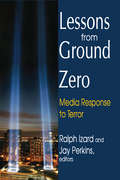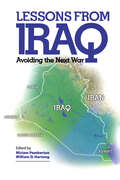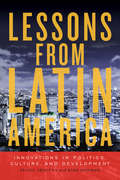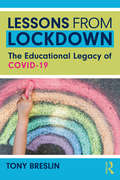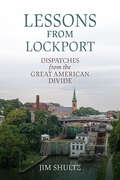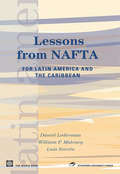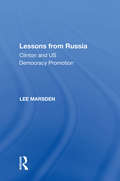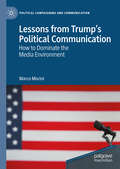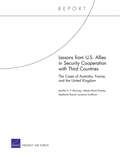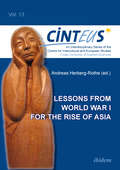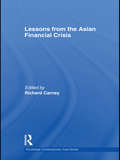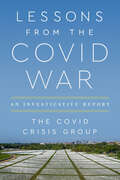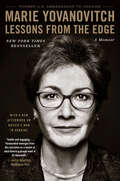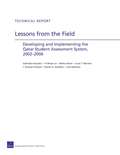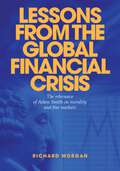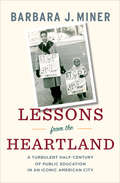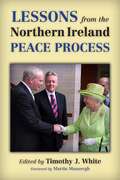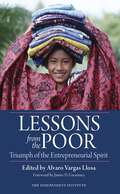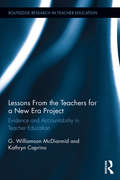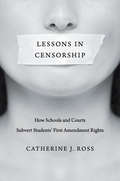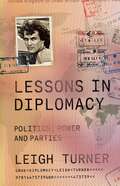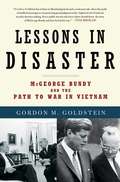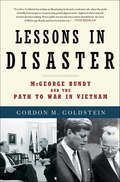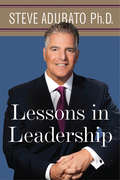- Table View
- List View
Lessons from Ground Zero: Media Response to Terror
by Jay PerkinsIt ranked among journalism's finest hours. That is what was heard in the weeks following September 11, 2001. They made mistakes, of course, but in covering one of the biggest disasters ever to hit the United States, journalists used their training, their experience, their understanding, and their sensitivity to provide coverage that helped bring understanding and a sense of calm to the chaos. Their performance did not end with reporting the immediate impact of the catastrophe. They continued to analyze what happened, the impact to property and human lives, the impact on government and foreign relations. Lessons from Ground Zero's examines journalism's efforts to cover a crisis, while analyzing journalism itself. Many lessons were evident to journalists as they sought to cope with the challenges of covering 9/11. The long-term question, however, is whether the answers they found served as catalysts for better journalism in the future, or whether they have been forgotten, put into the closet of old memories with no noticeable long-term impact. This book analyzes journalists' response to 9/11 through scholarly research and interviews with many of the journalists who covered 9/11. Sometimes they do not agree, but all are thoughtful and each adds to understanding. Public opinion polls show clearly that citizens appreciated and responded to media coverage. Given that this occurred in a time frame in which public approval of American journalism had declined, it is reasonable to ask what the media did that was different from their normal practices. This book provides some of the answers.
Lessons from Iraq: Avoiding the Next War
by William D. Hartung Miriam PembertonIf what is shaping up to be the worst foreign policy disaster in U.S. history has an upside, it is that the current war in Iraq should definitively, permanently settle a handful of critical questions about American conduct in the world. This book provides a list of those questions and even ventures some answers in the form of key lessons from Iraq. The idea of assembling lessons as tools for avoiding the next war is less of a stretch than it seems, given the group of writers represented here. They include a Nobel Prize-winning economist; the former chief UN weapons inspector; and an Iraqi American whose weekly conversations with his relatives have given him a grim education on what living through a war to spread democracy is like on the ground. Also here is a Pulitzer Prize and National Book Award winner who traces the recurring American bad habit of starting wars as tryouts for big ideas. All societies need a ready reference handbook that draws some lines around its conduct of war. The Bush administration has produced a radical overhaul of the U.S. manual. Given the Iraq experience, it is urgent that we reject this version and think again. This book is a manageably sized, accessibly written, affordable compilation of key points that most urgently need to be rethought.
Lessons from Latin America: Innovations In Politics, Culture, And Development
by Kirk Bowman Felipe ArocenaSince the early 1980s, Latin American countries have been innovative in a range of policy and cultural experiences, including health care, voting, pensions, and multiculturalism. And yet, their policy innovations are rarely found in textbooks. This book addresses that gap, providing a fascinating and wide-ranging exploration of both the history of "looking down" at Latin America and the political, economic, and cultural "lessons" (including successes, failures, and unintended consequences) that should inform important policy discussions around the world.
Lessons from Lockdown: The Educational Legacy of COVID-19
by Tony BreslinLessons from Lockdown explores the impact of COVID-19 on our schooling systems, on the young people and families that they serve and on all who work in – and with – our schools, and asks what the long-term ramifications of the pandemic might be for the pedagogy and purpose of formal education. Drawing on the voices of more than a hundred pupils, parents and professionals, it reveals how teachers and learners are adapting practice in areas such as curriculum modelling, parental engagement, assessment and evaluation and blended and online learning. In this timely new book, Tony Breslin draws on his experience as a teacher, researcher, examiner, school governor and policy influencer to assess what the educational legacy of COVID-19 could be, and the potential that it offers for reframing how we ‘do’ schooling. Whatever your place in this landscape, Lessons from Lockdown is a must-read for all concerned about the shape and purpose of schooling systems in mature economies – schooling systems and economies set on recovering from the kind of ‘system shock’ that the pandemic has delivered.
Lessons from Lockport: Dispatches from the Great American Divide (Excelsior Editions)
by Jim ShultzA long-time liberal activist gets an up-close political education about conservative America when he moves to a small town in upstate New York.During a time of great national division and a growing working-class rebellion that has turned American politics on its head, a longtime liberal activist moves to a small town in the conservative northwest corner of New York State. He becomes a weekly opinion columnist for the city's two-hundred-year-old daily newspaper. His columns force light into the dark corners of local politics and provoke local debate over national issues, from guns to climate change. Dozens of people begin to speak to him about his columns, in stores, on the street, in playgrounds, and beyond. His columns also spark fierce debate in a community Facebook group that includes almost everyone in town. The result is an up-close education about what makes small-town America tick, just as small towns like this one are driving a national political upheaval. Told through stories that will entertain readers as well as make them think, Lessons from Lockport offers a unique look at one of the most misunderstood corners of American culture.
Lessons from NAFTA: For Latin America and the Caribbean
by Daniel Lederman Luis Serven William F. MaloneyAnalyzing the experience of Mexico under the North American Free Trade Agreement (NAFTA), Lessons from NAFTA aims to provide guidance to Latin American and Caribbean countries considering free trade agreements with the United States. The authors conclude that the treaty raised external trade and foreign investment inflows and had a modest effect on Mexico's average income per person. It is likely that the treaty also helped achieve a modest reduction in poverty and an improvement in job quality. This book will be of interest to scholars and policymakers interested in international trade and development.
Lessons from Russia: Clinton and US Democracy Promotion
by Lee MarsdenLee Marsden presents one of the most original and comprehensive analyses of US democracy promotion in Russia and argues that in order to understand the failings of democracy assistance in Russia, it is necessary to understand the inter-relation of macro- and micro-level policy. The book introduces two new models of foreign policy analysis which increase understanding of both the formulation and implementation of foreign policy. Furthermore, it demonstrates how the promotion of democracy in Russia was substantially flawed due to implementation and the US foreign policy process.
Lessons from Trump’s Political Communication: How to Dominate the Media Environment (Political Campaigning and Communication)
by Marco MoriniThis book explores Donald Trump’s political communication as a candidate and in the first two years in office. The 45th US President is dominating the media system and 'building the agenda' through the combined action of five strategies. He disintermediates his communication and manufactures a permanent campaign climate based on strong and inflammatory language to attract a constant and decisive media coverage. In disarticulating old-style political rhetoric, he privileges emotions over contents, slogans above thought. Trump’s jokes, mockeries and distinct rhetoric – showing similarities to rhetorical strategies of Nazis during the 1930s – help him impersonate the populist ‘everyday man’ who fights against the elites. His dominance of the news cycle also reflects a desire for higher TV ratings and Web traffic numbers. Essentially, Trump has critically exploited the media’s news logics and taken advantage of the American public's lack of trust in journalism.
Lessons from U.S. Allies in Security Cooperation with Third Countries: The Cases of Australia, France, and the United Kingdom
by Laurence Smallman Jennifer D. P. Moroney Celeste Ward Gventer Stephanie PezardSeveral key U. S. allies engage in security cooperation, albeit on a smaller scale than the United States. To see what the U. S. Air Force can learn from these efforts, the authors examined how and why threeallies--Australia, France, and the United Kingdom--provide security cooperation and highlight three key areas that could benefit from further collaboration: staff talks, exercises, and training followed by exercises.
Lessons from World War I for the Rise of Asia
by Andreas Herberg-RotheThis groundbreaking volume offers a historical comparison between the events leading up to World War I and current global tensions related to the economical and political rise of Asia. What are the risks that the desire of the new super power China and great powers like India to be recognized by the West could set off a chain of events resulting in the nightmare of a great power war? Assessing the similarities as well as differences between the build-up of World War I and today, it is argued that we need to understand the driving forces behind the scene of global politics: The conflict between rising, established, and disintegrating powers and the desire of recognition on all sides. Carefully dissecting the current power dynamics in play, the authors hope to contribute to a better understanding of world events in order to ensure that history will not repeat itself.
Lessons from World War I for the Rise of Asia (An Interdisciplinary Series of the Centre for Intercultural and European Studies #13)
by Harald Müller Christopher Coker Andreas Herberg-Rothe Gudrun Hentges Volker Hinnenkamp Carsten Rauch Namrata Goswami Andrey Gubin Astyom Lukin Pang Zhongying Anne Honer Hans Wolfgang PlatzerThis groundbreaking volume offers a historical comparison between the events leading up to World War I and current global tensions related to the economical and political rise of Asia. What are the risks that the desire of the new superpower China and great powers like India to be recognized by the West could set off a chain of events resulting in the nightmare of a great power war?Assessing the similarities as well as differences between the build-up of World War I and today, one needs to understand the driving forces behind the scene of global politics: The conflict between rising, established, and disintegrating powers and the desire for recognition on all sides. Carefully dissecting the current power dynamics in play, the authors hope to contribute to a better understanding of world events in order to ensure that history will not repeat itself.
Lessons from the Asian Financial Crisis (Routledge Contemporary Asia Series)
by Richard CarneyNearly ten years after the Asian Financial Crisis, financial turmoil has reappeared – this time it is ravaging the world's wealthiest countries and dragging the global economy along for the ride. It forces one to reflect on the last major financial crisis to afflict the global economy, and to consider whether there are any similarities, and whether there are any lessons from that crisis that we can apply to the current one. Written by a distinguished group of individuals from government, the private sector, international organizations, and academia, this book provides an overview of developments in the main affected countries during the Asian Financial Crisis, as well as the lessons learned and corrective measures taken at the country, regional, and international levels. Importantly, attention is also paid to the areas where substantial improvements are needed. The current crisis heightens the relevance of these lessons. Lessons from the Asian Financial Crisis will be invaluable to those studying international relations, international finance, international economics and East Asian studies.
Lessons from the Covid War: An Investigative Report
by Covid Crisis GroupThis powerful report on what went wrong—and right—with America&’s Covid response, from a team of 34 experts, shows how Americans faced the worst peacetime catastrophe of modern times Our national leaders have drifted into treating the pandemic as though it were an unavoidable natural catastrophe, repeating a depressing cycle of panic followed by neglect. So a remarkable group of practitioners and scholars from many backgrounds came together determined to discover and learn lessons from this latest world war. Lessons from the Covid War is plain-spoken and clear sighted. It cuts through the enormous jumble of information to make some sense of it all and answer: What just happened to us, and why? And crucially, how, next time, could we do better? Because there will be a next time. The Covid war showed Americans that their wondrous scientific knowledge had run far ahead of their organized ability to apply it in practice. Improvising to fight this war, many Americans displayed ingenuity and dedication. But they struggled with systems that made success difficult and failure easy. This book shows how Americans can come together, learn hard truths, build on what worked, and prepare for global emergencies to come. A joint effort from: Danielle Allen • John M. Barry • John Bridgeland • Michael Callahan • Nicholas A. Christakis • Doug Criscitello • Charity Dean • Victor Dzau • Gary Edson • Ezekiel Emanuel • Ruth Faden • Baruch Fischhoff • Margaret &“Peggy&” Hamburg • Melissa Harvey • Richard Hatchett • David Heymann • Kendall Hoyt • Andrew Kilianski • James Lawler • Alexander J. Lazar • James Le Duc • Marc Lipsitch • Anup Malani • Monique K. Mansoura • Mark McClellan • Carter Mecher • Michael Osterholm • David A. Relman • Robert Rodriguez • Carl Schramm • Emily Silverman • Kristin Urquiza • Rajeev Venkayya • Philip Zelikow
Lessons from the Edge: A Memoir
by Marie YovanovitchAn inspiring and urgent memoir by the former U.S. ambassador to Ukraine—a pioneering diplomat who spent her career advancing democracy in the post-Soviet world, and who electrified the nation by speaking truth to power during the first impeachment of President Trump. <p><p>By the time she became U.S. Ambassador to Ukraine, Marie Yovanovitch had seen her share of corruption, instability, and tragedy in developing countries. But it came as a shock when, in early 2019, she was recalled from her post after a smear campaign by President Trump’s personal attorney and his associates—men operating outside of normal governmental channels, and apparently motivated by personal gain. Her courageous participation in the subsequent impeachment inquiry earned Yovanovitch the nation’s respect, and her dignified response to the president’s attacks won our hearts. She has reclaimed her own narrative, first with her lauded congressional testimony, and now with this memoir.<p><p>A child of parents who survived Soviet and Nazi terror, Yovanovitch’s life and work have taught her the preciousness of democracy as well as the dangers of corruption. Lessons from the Edge follows the arc of her career as she develops into the person we came to know during the impeachment proceedings. <p> <b>New York Times Bestseller</b>
Lessons from the Field: Developing and Implementing the Qatar Student Assessment System, 2002-2006
by Vi-Nhuan Le Louis T. Mariano J. Enrique Froemel Gabriella C. Gonzalez Markus BroerCentral to Qatar's education reform was the development of internationally benchmarked curriculum standards and standards-based assessments in four subjects: Arabic, English as a foreign language, mathematics, and science. This report recounts the development of Qatar's standards-based student assessment system, providing important lessons learned for Qatar and other countries that are seeking to implement similar measures on a large scale.
Lessons from the Global Financial Crisis: The Relevance of Adam Smith on Morality and Free Markets
by Richard MorganAdam Smith was an advocate of the free market; however his first and widely-acclaimed work, The Theory of Moral Sentiments, was on ethics. While commentators tend to review this work in isolation from his writing on political economy, Richard Morgan argues that although The Wealth of Nations is concerned with political economy, Smith's pointed attacks on exploitation and greed reflect the ethics outlined in his first work and illuminate the constructive role he proposed for government.
Lessons from the Heartland: A Turbulent Half-Century of Public Education in an Iconic American City
by Barbara J. Miner&“Miner&’s story of Milwaukee is filled with memorable characters . . . explores with consummate skill the dynamics of race, politics, and schools in our time.&” —Mike Rose, author of The Mind at Work Weaving together the racially fraught history of public education in Milwaukee and the broader story of hypersegregation in the rust belt, Lessons from the Heartland tells of a city&’s fall from grace—and its chance for redemption in the twenty-first century. A symbol of middle American working-class values, Wisconsin—and in particular urban Milwaukee—has been at the forefront of a half century of public education experiments, from desegregation and &“school choice&” to vouchers and charter schools. This book offers a sweeping narrative portrait of an all-American city at the epicenter of public education reform, and an exploration of larger issues of race and class in our democracy. The author, a former Milwaukee Journal reporter whose daughters went through the public school system, explores the intricate ways that jobs, housing, and schools intersect, underscoring the intrinsic link between the future of public schools and the dreams and hopes of democracy in a multicultural society. &“A social history with the pulse and pace of a carefully crafted novel and a Dickensian cast of unforgettable characters. With the eye of an ethnographer, the instincts of a beat reporter, and the heart of a devoted mother and citizen activist, Miner has created a compelling portrait of a city, a time, and a people on the edge. This is essential reading.&” —Bill Ayers, author of Teaching Toward Freedom &“Eloquently captures the narratives of schoolchildren, parents, and teachers.&” —Library Journal
Lessons from the Northern Ireland Peace Process
by Timothy J. WhiteFrom the early 1970s through the mid-1990s, Northern Ireland was the site of bitter conflict between those struggling for reunification with the rest of Ireland and those wanting the region to remain a part of the United Kingdom. After years of strenuous negotiations, nationalists and unionists came together in 1998 to sign the Good Friday Agreement. Northern Ireland's peace process has been deemed largely successful. Yet remarkably little has been done to assess in a comprehensive fashion what can be learned from it. "Lessons from the Northern Ireland Peace Process" incorporates recent research that emphasizes the need for civil society and a grassroots approach to peacebuilding while taking into account a variety of perspectives, including neoconservatism and revolutionary analysis. The contributions, which include the reflections of those involved in the negotiation and implementation of the Good Friday Agreement, also provide policy prescriptions for modern conflicts. This collection of essays in "Lessons from the Northern Ireland Peace Process" fills a void by articulating the lessons learned and how--or whether--the peace processes can be applied to other regional conflicts.
Lessons from the Poor: Triumph of the Entrepreneurial Spirit
by James D. Gwartney Alvaro Vargas LlosaAn important contribution to the literature of economic development, this book presents case studies of productive entrepreneurship in contemporary Africa and Latin America. It looks at the growth of Kenya's chain stores and one-person kiosks, the rise of barter clubs in Argentina, and Nigeria's clothing-design industry to illustrate economists' insights about entrepreneurship and the role that government regulations often play in impeding economic development.Half the people in the world live on two dollars or less per day and roughly 600 million live on no more than one dollar per day. With thousands of international relief organizations, strategic government programs, and billions of dollars in foreign aid, why do so many underdeveloped countries remain unable to grow their economies beyond mere survival? It is this issue that internationally acclaimed political analyst Alvaro Vargas Llosa and a select group of economists examine in a series of case studies from around the world. These studies reveal that entrepreneurial energy can be a persistent catalyst for change. But unfortunately in societies dominated by political corruption and unnecessary regulation, men and women seeking to innovate must hurdle a series of challenges. Wealth transfer, favoritism, excessive taxation, and lack of institutional security all conspire against progress. Our contributors examine real world examples of entrepreneurship and argue that instead of redistributing existing wealth, developing countries should start working to create it.
Lessons from the Teachers for a New Era Project: Evidence and Accountability in Teacher Education (Routledge Research in Teacher Education)
by G. Williamson McDiarmid Kathryn CaprinoChronicling a high-profile and ambitious teacher preparation reform project that took place across 11 diverse U.S. institutions, this volume examines the strategies, program changes, accomplishments, and challenges from the Teachers for a New Era Project (TNE). TNE aimed to improve the preparation of K-12 teachers and address mounting criticisms of university-based teacher education. Funded primarily by the Carnegie Corporation of New York, TNE targeted the most persistant problems in university-based teacher preparation programs, focused on evidence-based assessment of program impact, and developed strategies for improvement. Exploring both the successes and tensions that arose from the program, this book contributes to future teacher education and program assessment endeavors, and offers lessons that can inform current policies and practices.
Lessons in Censorship: How Schools and Courts Subvert Students' First Amendment Rights
by Catherine J. RossAmerican public schools censor controversial student speech that the Constitution protects. Catherine Ross brings clarity to court rulings that define speech rights of young citizens and proposes ways to protect free expression, arguing that the failure of schools to respect civil liberties betrays their educational mission and threatens democracy.
Lessons in Diplomacy: Politics, Power and Parties
by Leigh TurnerIs a diplomat’s life really as glamorous as a royal visit, or as dramatic as a coup d’état in Turkey? Leigh Turner is a former British ambassador who led posts in Ukraine, Turkey and Austria. In this witty globe-trotting adventure through one of the most intriguing careers a person can have, Leigh relates his interactions with royalty of both the aristocratic and celebrity kinds, and with brilliant and extraordinary people who bestowed valuable lessons. Offering astute reflections on Brexit, Russia’s war with Ukraine and the chaos of modern politics, he sheds new light on the intricacies of modern statecraft, including what we all can learn from a good diplomat or ambassador. In this entertaining and accessible first-hand account, you’ll discover how diplomats really work with spies, how immunity allows killers to escape justice, how Russia broke up the Soviet Union and then nursed its resentment at the consequences -- and how to throw, and be invited to, a great cocktail party.
Lessons in Disaster: McGeorge Bundy and the Path to War in Vietnam
by Gordon M. GoldsteinInteresting book about Bundy and the decisions made on whether or not to send troops into Vietnam.
Lessons in Disaster: McGeorge Bundy and the Path to War in Vietnam
by Gordon M. GoldsteinA revelatory look at the decisions that led to the US involvement in Vietnam, drawing on the insights and reassessments of one of the war’s architects.A Foreign Affairs BestsellerIn the last years of his life, the former US national security adviser McGeorge Bundy decided to revisit the role he played in leading the nation into the Vietnam War as a counselor to Presidents John F. Kennedy and Lyndon B. Johnson. “I had part in a great failure,” he said. “If I have learned anything I should share it.”In this original and provocative work, the political scientist Gordon M. Goldstein draws on his prodigious research as well as interviews and analysis he conducted with Bundy before his death in 1996 to distill the essential lessons of America’s involvement in Vietnam. Lessons in Disaster is a historical tour de force on the uses and misuses of American power.“Gordon Goldstein has written an illuminating book and a cautionary tale about the perils of intellectual arrogance overpowering good judgment at the highest levels of national security decision making. Every public servant and every citizen should know the story of McGeorge Bundy and how he lost his way.” —Tom Brokaw“A compelling portrait of a man once serenely confident, searching decades later for self-understanding.” —Richard Holbrooke, The New York Times Book Review
Lessons in Leadership
by Steve AdubatoIn this practical guide, Emmy Award-winning public broadcasting anchor Steve Adubato teaches readers to be self-aware, empathetic, and more effective leaders at work and at home. His powerful case studies spotlighting dozens of leaders--from Pope Francis to New Jersey governor Chris Christie--are complemented by concrete tips and tools based in real-life scenarios. With Lessons in Leadership, readers can learn to steer others through difficult economic times, to mentor rising leaders, to provide straight talk to underperforming employees, and even how to lead a company through a significant change.
